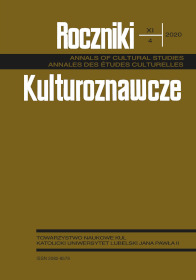The Idea of New Middle Ages in the Light of Friedrich Nietzsche’s Nihilism
Abstrakt
Idea nowego średniowiecza w świetle nihilizmu Friedricha Nietzschego
W artykule autor proponuje koncepcję nowego średniowiecza i opisuje nowoczesną i ponowoczesną przemianę zachodzącą w kulturze zachodniej, która przypomina przejście okresu średniowiecza ze świata grecko-rzymskiego do świata chrześcijańskiego. Za pomocą koncepcji nowego średniowiecza można zdefiniować przejście ze świata chrześcijańskiego do świata obecnie nieznanego, o nowych wartościach, odpowiadających paradygmatom nauki i techniki. Takie przejście wyraża idea nihilizmu Fryderyka Nietzschego. Zawiera się w nim postulat nowego człowieka i postulat nowych wartości w odpowiedzi na zjawisko śmierci Boga we współczesnym i ponowoczesnym świecie. Nihilizm Nietzschego jest ściśle powiązany z fundamentalnymi przemianami zachodzącymi w kulturze zachodniej. Obejmuje nie tylko zanegowanie wartości, które są podstawą świata chrześcijańskiego, ale także konieczność znalezienia nowych wartości, opartych na świadomości braku Boga, który gwarantuje wartości chrześcijańskie. Nihilizm Nietzschego jest też krytycznym odniesieniem do tych postaw, które takiej zmiany wartości w ogóle nie dostrzegają lub całkiem jej zaprzeczają.
Bibliografia
Bodmer, Eugen Roth, Schlüssel zu Nietzsches Zarathustra: Ein interpretierender Kommentar zu Nietzsches Werk “Also sprach Zarathustra.” Meilen: Meilen-Druck, 1975.
Caputo, John D., and Gianni Vattimo. After the Death of God. New York: Columbia University Press, 2007.
Eliade, Mircea. Histoire des croyances et des idées religieuses. Vol. 1–2. Paris: Payot, 1976.
Eliade, Mircea. The Sacred and the Profane: The Nature of Religion. Translated by Willard R. Trask. New York: Houghton Mifflin Harcourt, 1959.
Freud, Siegmund. Das Unbehagen in der Kultur. Wien: Internationaler Psychoanalytischer Verlag, 1930.
Girard, René. La Violence et la sacré. Paris: Éditions Bernard Grasset, 1972.
Heidegger, Martin. Beiträge zur Philosophie. Frankfurt am Main: Vittorio Klostermann, 1994.
Heidegger, Martin. “Die Frage nach der Technik.” In Vorträge und Aufsätze, Stuttgart: Günther Neske, 1994.
Heidegger, Martin. Hölderlins Hymnen »Germanien« und »Der Rhein«. Gesamtausgabe Abteilung: Vorlesungen. Band 39. Frankfurt am Main: Vittorio Klostermann, 1989.
Heidegger, Martin. Holzwege. Frankfurt am Main: Vittorio Klostermann, 1994.
Heidegger, Martin. Nietzsche. Vol. 1–2. Stuttgart: Günther Neske, 1998.
Heidegger, Martin. Was heißt Denken? Tübingen: Niemeyer, 1984.
Heidegger, Martin. Zur Bestimmung der Philosophie. Gesamtausgabe Abteilung: Vorlesungen. Band 56/57. Frankfurt am Main: Vittorio Klostermann, 1987.
Hölderlin, Friedrich. Sämtliche Werke und Briefe. Vol. 1-3. Darmstadt: Wissenschaftliche Buchgesellschaft, 1992.
Homer. Odyssey. Translated by Robert Fitzgerald. New York: Farrar, Straus, and Giroux, 1998.
Jacobi, Friedrich H. Jacobi. Werke. Vol. 3. Leipzig: Fleischer, 1816.
Jean Paul. Werke. Vol. 5: Vorschule der Ästhetik. München: Hanser, 1959-1963.
Kerényi, Karl. Die Mythologie der Griechen. Vol. 1. Stuttgart: Klett-Cotta, 1997.
Krasowski, Robert. “Polscy politycy stają się intelektualnymi warzywami [wywiad miesiąca!]. Robert Krasowski w rozmowie z Łukaszem Pawłowskim i Tomaszem Sawczukiem,” Kultura Liberalna, 2014, nr 7 (267). Accessed February 25, 2021, http://kulturaliberalna.pl/ 2014/02/18/polityka-religia/.
Lyotard, Jean-François. The Postmodern Condition: A Report of Knowledge. Translated by Geoff Bennington and Brian Massumi. Minneapolis: University of Minnesota Press, 1984.
Mann, Thomas. “Meine Zeit.” In Reden und Aufsätze. Gesammelte Bände, vol. 11. Frankfurt am Main: Fischer Taschenbuch Verlag, 1990.
Michalski, Krzysztof. Płomień wieczności. Eseje o myślach Fryderyka Nietzschego. Kraków: Instytut Wydawniczy Znak, 2007.
Müller-Lauter, Wolfgang, and Wilhelm Goerdt. “Nihilismus.” In Historisches Wörterbuch der Philosophie, vol. 6, edited by Joachim Ritter, Karlfried Gründer, and Gottfried Gabriel, col. 846-849. Basel: Scheidegger and Spiess, 1984.
Nietzsche, Friedrich. Also sprach Zarathustra. Kritische Studienausgabe in 15 Bänden [KSA], edited by Giorgio Colli and Mazzino Montinari. Vol. 4. München: dtv, 1999.
Nietzsche, Friedrich. Beyond Good and Evil. Translated by Judith Norman. Cambridge: Cambridge University Press, 2002.
Nietzsche, Friedrich. Der Antichrist. Kritische Studienausgabe in 15 Bänden [KSA], edited by Giorgio Colli and Mazzino Montinari. Vol. 6. München: dtv, 1999.
Nietzsche, Friedrich. Der Wille zur Macht. Leipzig: C.G. Naumann, 1906.
Nietzsche, Friedrich. Fröhliche Wissenschaft. Kritische Studienausgabe in 15 Bänden [KSA], edited by Giorgio Colli and Mazzino Montinari. Vol. 3. München: dtv, 1999.
Nietzsche, Friedrich. Gay Science. Translated by Josefine Nauckhoff and Adrian Del Caro. Cambridge: Cambridge University Press, 2001.
Nietzsche, Friedrich. Jenseits von Gut und Böse. Kritische Studienausgabe in 15 Bänden [KSA], edited by Giorgio Colli and Mazzino Montinari. Vol. 5. München: dtv, 1999.
Nietzsche, Friedrich. Nachlass 1885-1887. Kritische Studienausgabe in 15 Bänden [KSA], edited by Giorgio Colli and Mazzino Montinari. Vol. 12. München: dtv, 1999.
Nietzsche, Friedrich. “On the Uses and Disadvangates of History for Life.” Translated by Reginald John Holingdale Hollingdale. In Friedrich Nietzsche, Untimely Meditations, ed. Daniel Breazeale. Cambridge: Cambridge University Press, 1997.
Nietzsche, Friedrich. Sämtliche Briefe. Bd. 3. München: dtv, 1986.
Nietzsche, Friedrich. The Will to Power. Translated by Reginald John Holingdale, edited by Walter Kaufmann. New York: Random House, 1968.
Nietzsche, Friedrich. Thus spoke Zarathustra. Translated by Thomas Common. New York: The Modern Libray, 1917.
Nietzsche, Friedrich. Über Wahrheit und Lüge im außermoralischen Sinne. Ditzingen: Reclam Taschenbuch, 2018.
Plato. Republic. Translated by Allan Bloom. New York: Basic Books, 1991.
Plato. Statesman. Translated by Christopher Rowe. Cambridge: Hackett, 1999.
Posłuszna, Elżbieta, and Jacek Posłuszny. “Resentyment i nihilizm w ujęciu Fryderyka Nietzschego.” In Nihilizm. Dzieje, recepcja, prognozy, edited by Stanisław Gromadzki and Jerzy Niecikowski. Warszawa: Wydział Filozofii i Socjologii Uniwersytetu Warszawskiego, 2001.
Rhode, Erwin. Psyche. Seelenkult und Unsterblichkeitsglaube der Griechen. Freiburg im Breisgau/Leipzig: Mohr, 1894.
Rorty, Richard, and Gianni Vattimo. The Future of Religion. New York: Columbia University Press, 2005.
Vattimo, Gianni. La fine della modernità. Milano: Garzanti, 1998.
Vattimo, Gianni. Nihilism and Emancipation. New York: Columbia University Press, 2003.
Vattimo, Gianni. Oltre l’interpretazione. Il significato dell’ermeneutica per la filosofia. Economica Laterza. Roma/Bari: Laterza, 2002.
Vattimo, Gianni. “Toward a Nonreligious Christianity.” In John D. Caputo and Gianni Vattimo. After the Death of God, edited by ed. Jeffrey W. Robbins. New York: Columbia University Press, 2007.





